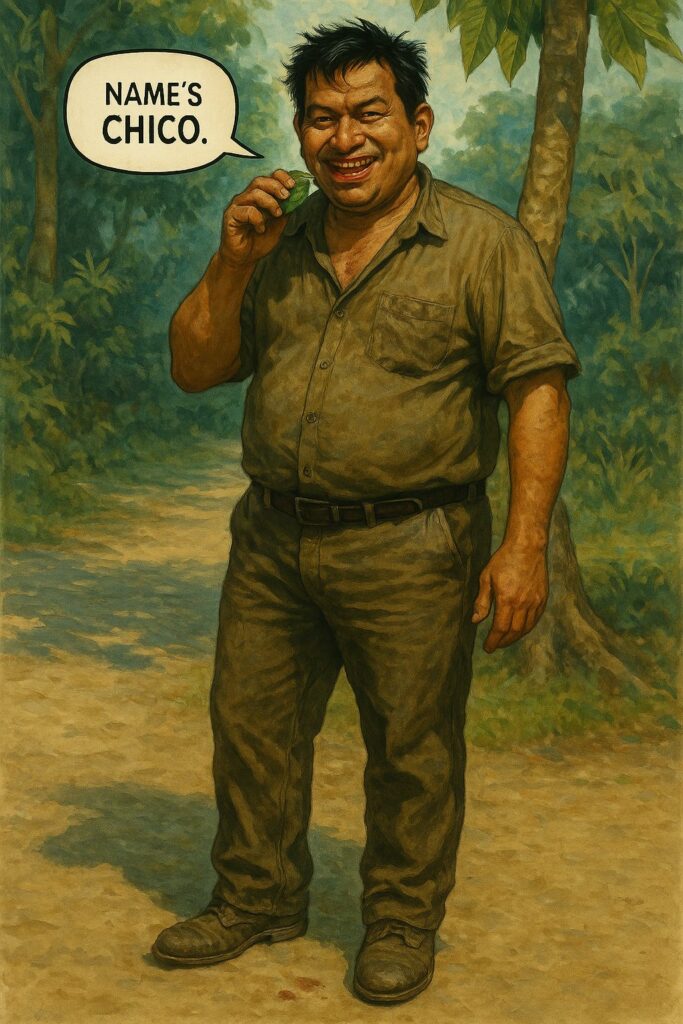Search Results for 'tree'
-
AuthorSearch Results
-
February 5, 2026 at 2:14 am #8054
In reply to: The Hoards of Sanctorum AD26
Mrs. Fennel was beating the dust out of a rug with more violence than was strictly necessary. “Another bloody rug,” she moaned. “If I had a penny for every rug in this place, Boothroyd!”
She shook her head, then cursed, as a cascade of dust floated from her hair. “No idea which of them four picked this one up from god-knows-where, but they’re each as bad as the other.”
She paused to wipe her brow with a corner of her apron, wheezing slightly. “I’m telling you,” she whispered, peering at him conspiratorially, “it’s not just clutter anymore. It’s … REMAINS.”
Boothroyd looked up from a tray of seedlings, his brow furrowing. “Remains, Mrs. F?”
“Human remains!” she hissed, leaning in so close he could smell the peppermint gum on her breath. “A stinking, ancient bone in a plastic box, and Miss Cerenise acting like it’s a piece of the Crown Jewels. Then there’s Miss Yvoise, snapping photos on her fancy phone like she’s … I dunno … Sherlock Holmes or something. And the smell… dear lord, I couldn’t get out of there fast enough.”
Boothroyd grunted, his gaze drifting toward the cellar door. “They do seem particularly out of control lately. My boots are still damp from that ridiculous boat business. I’m not sure they know which century they’re living in.”
“Anyway bone or no,” Mrs. Fennel huffed, “if that gentleman from the Council shows up, that Varlet fellow they’re on about, we’ll all be out on the street, mark my words!”
January 19, 2026 at 4:22 am #8050In reply to: The Hoards of Sanctorum AD26
The reek hit her with the force of a physical blow. Yvoise was sensitive to smell; for hundreds of years, Yvoise had cultivated the scent of library dust and dried wildflowers, a fragrance she believed to be the height of sophistication.
“Spirius,” she said at last. “The spiders are a symptom. This dreadful smell must surely be the manifestation of Austreberthe’s lingering ego. She always was a bit… pungent.”
Yvoise immediately felt guilty for speaking ill of the departed. “I’m so sorry,” she said, “that was not kind of me.” She was mostly annoyed at herself for not being able to comprehend Austreberthe’s choice to leave. She checked her smartwatch. Her ‘Conflict Resolution’ seminar was a lost cause; the group would have to resolve their own, dare she think it, rather petty tensions today. Of course, having the wisdom of hundreds of years’ experience does tend to give one a unique perspective.
“I think I overheard Cerenise say the Varlet descendant works in Gloucester?” Yvoise continued, her fingers tapping her phone. ”I’ve done a cross-reference on the municipal database and have found a Varlet who works for the Environmental Health Department.” She snorted. “Of course, the irony is, if that stench reaches the street… he won’t be coming for a family reunion; he’ll be coming with a condemnation order and a dumpster.”
The colour drained from Spirius’s face. Yvoise knew that the only thing a fellow hoarder feared more than fire was a man with a dumpster. “Don’t worry,” she said, kindly patting Spirius on the arm, “I was joking… I’m mostly, or nearly sure it won’t come to that.”
She pointed a manicured finger at the Topperware tower. “Be brave and open that top box. If there is a relic in there causing this stench, we need to neutralize it with vinegar immediately.”
Spirius reached out, his hand trembling as he gripped the lid of the highest container. As the lid clicked open, the frightful smell erupted into the room, a thick, dank smell of wet wool and lye soap. Spirius hastily set the container down and his hand flew to his nose.
“I believe it is her laundry,” he wheezed eventually. “I’m sure I saw a lace thingammy before I was overcome. Cerenise will surely want to know.”
“It’s a biohazard,” said Yvoise, as she quickly snapped some photos of it for her ‘Relics and Records’ files.
January 6, 2026 at 6:20 pm #8044In reply to: The Hoards of Sanctorum AD26
With a warm smile of approval, Cerenise tapped out the names and dates on her keyboard. So refreshing when people were original when naming the fruit of their loins, she thought. Some of the family trees she’d done for friends and clients had been a veritable cesspit of endlessly repeated Johns and Marys, Williams and Elizabeths. Despite suppressing a shudder when introduced to a modern human named River or Sky, or worse, the ridiculously creative spelling of a common name, some of the older examples of unusual names she found quite delightful. Especially, it had to be said, French ones.
Pierre Wenceslas Varlet born on the 28th of September, 1824 in Clenleu, Pas-de-Calais, brother of Austreberthe Varlet, born two years previously on the 8th of June. Wenceslas! What would you call Wenceslas for short? she mused. Wence?
“An ’twere not as good a deed as drink to turn true man and to leave these rogues, I am the veriest varlet that ever chewed with a tooth”.
A cautious knock at the door interrupted Cerenise’s mental meanderings.
“Enter,” she called, and Laddie Bentry sidled in looking sheepish.
“Ah, it’s you, the veriest varlet of number 26. Well, what is it? You look as though you accidentally dropped Helier’s trashy novel in the water butt.”
Taken aback by Cernice’s perspicacity, Laddie recoiled slightly and then squared his shoulders. “How did you know?” he asked.
“Oh just a lucky guess,” Cerenise replied breezily, tapping the side of her nose. “I suppose you want me to order you another copy from Amaflob before he notices? I’ll arrange for an express delivery. Keep an eye out for the delivery man”
Waving away his thanks, she picked up the old document on her desk that Yvoise had kindly provided, albeit reluctantly, and squinted at it. She could make out the name Austreberthe, but what did the rest say?
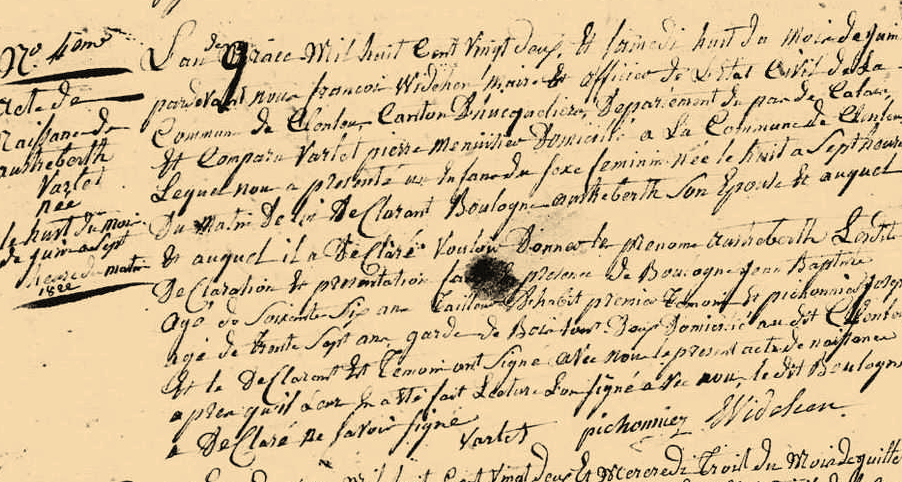
Cerenise dozed off, dreaming of the Folies Bergere. The atmosphere was exciting and convivial at first, escalating into an eruption of approval when the new act came on the stage. Cerenise felt the energy of the crowd but her attention was drawn to the flamboyant figure of a man dressed as one of the three kings of the Magi, and he was making his way over to her. Why, it was Lazuli Galore! What on earth was he doing here? And who was that dumpy overly made up woman in the blue dress, Godfreda, who had tagged along with them?
Another knock on the door wakened her and she called out “Come in!” in an irritable tone. She’d been having such fun in the dream. “Oh it’s you, oh good, the book has arrived.”
Laddie shifted his feet and replied, “Well yes, a Liz Tattler novel has arrived.”
“Oh, good, well be off with you then so I can get on with my work.”
“But it’s not The Vampires of Varna. It’s The Valedictorian Vampires of Valley View High.”
“Jolly good, I expect you’ll enjoy it,” Cerenise said, picking up the old document again and peering at it. Perceiving that Laddie had not yet exited the room, she looked up. “Helier won’t notice, those books are all the same. Now get off with you.”
January 4, 2026 at 10:01 pm #8043In reply to: Finder’s Keepers of the Hoard
A cinematic, low-angle shot inside a flooded, ancient brick sewer tunnel that looks like a mix of Roman catacombs and Victorian industrial plumbing. The water is dark and murky, reflecting the light of a flickering lantern.
In the center of the frame, floating precariously, is a bright yellow, cheap inflatable dinghy.
Inside the dinghy are two men:
-
Spirius: An elderly man with a nervous expression, wearing a high-vis vest over ancient saintly robes. He is clutching an antique musket that is clearly too heavy for him. A faint, golden neon halo flickers erratically behind his head like a faulty streetlamp.
-
Boothroyd: A grumpy, weather-beaten gardener in a tweed cap. He looks completely resigned to his fate, lazily paddling with a plastic oar in one hand and holding a sharp garden spear in the other.
Action: The dinghy squeaks as it bumps against the wet brick walls. Spirius jumps at a drip of water falling from the ceiling. Something large ripples the water in the foreground—a menacing shadow moving beneath the surface.
Atmosphere:
-
Lighting: Chiaroscuro—deep shadows and warm lantern light, contrasting with the synthetic yellow of the boat.
-
Mood: Tense but ridiculous. High-stakes fantasy meets low-budget reality.
Movement:
-
The camera tracks slowly backward as the boat drifts forward.
-
The water ripples ominously.
-
Spirius’s halo buzzes and dims when he gets scared.
January 3, 2026 at 8:09 pm #8025In reply to: The Hoards of Sanctorum AD26
As soon as Boothroyd had gone, Laddie Bentry, the under gardener, emerged from behind the Dicksonia squarrosa that was planted in a rare French Majolica Onnaing dragon eagle pot. The pot, and in particular the tree fern residing within it, were Laddie’s favourite specimen, reminding him of his homeland far away.
Keeping a cautious eye on the the door leading into the house, Laddie hurried over to the cast iron planter and retrieved the Liz Tattler novel hidden underneath. Quickly he tucked in into the inside pocket of his shabby tweed jacket and hastened to the door leading to the garden. Holding on to his cap, for the wind was cold and gusty, he ran to the old stable and darted inside. Laddie reckoned he had an hour or two free without Boothroyd hovering over him, and he settled himself on a heap of old sacks.
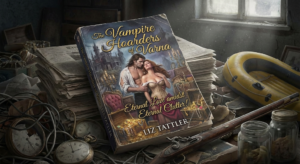 The Vampire Hoarders of Varna. It wasn’t the first time Laddie had seen Boothroyd surreptitiously reading Helier’s books, and it had piqued his curiosity. What was it the old fart found so interesting about Helier’s novels? The library was full of books, if he wanted to read. Not bothering to read the preface, and not having time to start on page one, Laddie Bentry flicked through the book, pausing to read random passages.
The Vampire Hoarders of Varna. It wasn’t the first time Laddie had seen Boothroyd surreptitiously reading Helier’s books, and it had piqued his curiosity. What was it the old fart found so interesting about Helier’s novels? The library was full of books, if he wanted to read. Not bothering to read the preface, and not having time to start on page one, Laddie Bentry flicked through the book, pausing to read random passages.….the carriage rattled and lurched headlong through the valley, jostling the three occupants unmercifully. “I’ll have the guts of that coachman for garters! The devil take him!” Galfrey exclaimed, after bouncing his head off the door frame of the compartment.
“Is it bleeding?” asked Triviella, inadvertently licking her lips and she inspected his forehead.
“The devil take you too, for your impertinence,” Galfrey scowled and shook her off, his irritation enhanced by his alarm at the situation they found themselves in.
Ignoring his uncharacteristic bad humour, Triviella snuggled close and and stroked his manly thigh, clad in crimson silk breeches. “Just think about the banquet later,” she purred.
Jacobino, austere and taciturn, on the opposite seat, who had thus far been studiously ignoring both of them, heard the mention of the banquet and smiled for the first time since…
Laddie opened the book to another passage.
“……1631, just before the siege of Gloucester, and what a feast it was! It was hard to imagine a time when we’d feasted so well. Such rich and easy pickings and such a delightful cocktail. One can never really predict a perfect cocktail of blood types at a party, and centuries pass between particularly memorable ones. Another is long overdue, and one would hate to miss it,” Jacobino explained to the innocent and trusting young dairy maid, who was in awe that the handsome young gentleman was talking to her at all, yet understood very little of his dialogue.
“Which is why,” Jacobino implored, taking hold of her small calloused hands, “You must come with me to the banquet tonight.”
Little did she know that her soft rosy throat was on the menu…..
December 31, 2025 at 11:11 am #8009In reply to: Finder’s Keepers of the Hoard
Some ideas for the background thread and character profiles for “The Hoards of Emporium 26.”
The Setting: Emporium 26
They live in Gloucester (ancient Glevum), a city built on Roman bones where the layout of the streets still follows the legions’ sandals. They inhabit a sprawling, shared Georgian townhouse complex that has been knocked through into one labyrinthine dwelling—Number 26.
To the outside world, it looks like a dilapidated heritage site. Inside, it is The Emporium: a geological stratification of history, where layers of Roman pottery are mixed with 1990s Beanie Babies and medieval reliquaries.
The Background Thread: “The Weight of Eternity”
Why do they hoard? Because when you live forever, “letting go” feels like losing a piece of the timeline. Hoarding objects is for them an accumulation of evidence of existence.
- The Curse: They cannot die naturally, but they can fade if they are forgotten. The “stuff” anchors them to the physical plane.
- The “Halo” Effect: Occasionally, when they are arguing over whose turn it is to do the dishes, or when they find a lost treasure, the stained-glass light of their old divinity flickers behind their heads—a neon halo of forgotten holiness.
The Hoarders & Their Stashes
1. Helier ( The Hermit / The Dreamer)
- Saintly Origin: Based on St. Helier (Jersey/Normandy). He was an ascetic hermit who lived in a cave and was eventually beheaded.
- Modern Persona: A soft-spoken agoraphobe who hasn’t left the house since the invention of the internet. He wears oversized cardigans that smell like old library books.
- The Mania: Escapism & Communication.
- Because he spent centuries in silence on a rock, he is now obsessed with human stories and noise.
- The Hoard: ” The Media Mountain.”
- His wing of the house is a fire hazard of pulp fiction, towering stacks of National Geographic (dating back to the first issue), thousands of VHS tapes (he has no VCR), and tangled knots of ethernet cables that he refuses to throw away “in case they fit a port from 1998.”
- The Secret Stash: Beneath a pile of “The Hoarder Vampires” novels lies his true relic: The Stone Pillow. The actual rock he slept on in the 6th century. He still naps on it when his back hurts.
2. Spirius (The Bishop / The Container)
- Saintly Origin: Evocative of St. Exuperius (Bayeux). A driver-out of demons and a man of grand gestures.
- Modern Persona: A nervous, fidgety man who is convinced the world is leaking. He is the “fixer” of the group but usually makes things worse with duct tape.
- The Mania: Containment & Preservation.
- In the old days, he bottled demons. Now, he’s terrified of running out of space to put things.
- The Hoard: “The Vessel Void.”
- Spirius hoards anything that can hold something else. Empty jam jars (washed, mostly), Tupperware with no matching lids, biscuit tins, and thousands of plastic carrier bags stuffed inside other carrier bags (the “Bag of Bags”).
- The Secret Stash: In a locked pantry, he keeps a shelf of sealed mason jars labeled with dates like “1431” or “1789.” He claims they contain the “Sigh of a King” or “The smell of rain before the Plague.” It’s actually just dust, but the jars vibrate slightly.
3. Cerenise (The Weaver / The Mender)
- Saintly Origin: Evocative of St. Ceneri or St. Cerneuf. A saint of travelers, or perhaps needlework.
- Modern Persona: She is the “Wheelchair Girl’s” friend mentioned in the intro? Or perhaps she is in a wheelchair now—not because she can’t walk, but because she’s too tired from walking for 1,500 years. She is sharp-tongued and fashionable in a “crazy bag lady” sort of way.
- The Mania: Potential & Texture.
- She sees the soul in broken things. She cannot throw away anything that “could be fixed.”
- The Hoard: “The Fabric of Time.”
- Her rooms are draped in layers of textiles: velvet curtains from a 1920s cinema, moth-eaten tapestries depicting her own miracles (she thinks the nose is wrong), and buttons. Millions of buttons. She also hoards broken appliances—toasters, lamps, clocks—insisting she will repair them “next Tuesday.”
- The Secret Stash: A mannequin dressed in a perfectly preserved Roman stola, hidden under forty layers of polyester coats. It’s the outfit she wore when she performed her first miracle. She tries it on every New Year’s Eve.
4. Yvoise (The Advocate / The Bureaucrat)
- Saintly Origin: Evocative of St. Yves (Patron of Lawyers/Brittany/Normandy). The arbiter of justice.
- Modern Persona: The “Manager” of Emporium 26. She wears power suits from the 80s and is always carrying a clipboard. She loves rules, even if she invents them.
- The Mania: Proof of Truth.
- She is terrified of being forgotten or cheated. She needs a receipt for everything.
- The Hoard: “The Archive of Nothing.”
- Yvoise hoards paper. Receipts from a coffee bought in 1952, bus tickets, expired warranties, junk mail, and legal disclaimers torn off mattresses. Her room looks like the inside of a shredder that exploded. She claims she is building “The Case for Humanity.”
- The Secret Stash: A filing cabinet labeled “Do Not Open.” Inside is not paper, but Seeds. Seeds from the trees of ancient Gaul. She is saving them for when the paper finally takes over the world and she needs to replant the forest she misses.
Starter: The Reading of Austreberthe’s Will
The story kicks off because Austreberthe (The Saint of Washing/Water) has died. Her hoard was Soap and Water.
- The house is now flooding because her magical containment on the plumbing has broken.
- The remaining four must navigate her “Tsunami Wing”—a treacherous dungeon of accumulated bath bombs, stolen hotel towels, and aggressive washing machines—to find her Will.
- The Will is rumored to reveal the location of the “Golden Key,” an object that can legally terminate their lease on Emporium 26, which none of them want, but all of them crave.
December 30, 2025 at 6:42 pm #8003In reply to: The Elusive Samuel Housley and Other Family Stories
JOHN BROOKS ALIAS PRIESTLAND
1766-1846John Brooks, my 5x great grandfather, was born in 1766, according to the 1841 census and the burial register in 1846 which stated his age at death as 80 years, but no baptism has been found thus far.
On his first son’s baptism in 1790 the parish register states “John son of John and Elizabeth Brooks Priestnal was baptised”. The name Priestnal was not mentioned in any further sibling baptism, and he was John Brooks on his marriage, on the 1841 census and on his burial in the Netherseal parish register. The name Priestnal was a mystery.
I wondered why there was a nine year gap between the first son John, and the further six siblings, and found that his first wife Elizabeth Wilson died in 1791, and in 1798 John married Elizabeth Cowper, a widow.
John was a farmer of Netherseal on both marriage licences, and of independent means on the 1841 census.
Without finding a baptism it was impossible to go further back, and I was curious to find another tree on the ancestry website with many specific dates but no sources attached, that had Thomas Brooks as his father and his mother as Mary Priestland. I couldn’t find a marriage for John and Mary Priestland, so I sent a message to the owner of the tree, and before receiving a reply, did a bit more searching.
I found an article in the newspaper archives dated 9 August 1839 about a dispute over a right of way, and John Brooks, 73 years of age and a witness for the complainant, said that he had lived in Netherseal all his life (and had always know that public right of way and so on).
I found three lists of documents held by the Derby Records Office about property deeds and transfers, naming a John Brooks alias Priestland, one in 1794, one in 1814, and one in 1824. One of them stated that his father was Thomas Brooks. I was beginning to wonder if Thomas Brooks and Mary Priestland had never married, and this proved to be the case.
The Australian owner of the other tree replied, and said that they had paid a researcher in England many years ago, and that she would look through a box of papers. She sent me a transcribed summary of the main ponts of Thomas Brooks 1784 will:
Thomas Brooks, husbandman of Netherseal
To daughter Ann husband of George Oakden, £20.
To grandson William Brooks, £20.
To son William Brooks and his wife Ann, one shilling each.
To his servant Mary Priestland, £20 and certain household effects and certain property.
To his natural son John Priestland alias Brooks, various properties and the residue of his estate.
John Priestland alias Brooks appointed sole executor.It would appear that Thomas Brooks left the bulk of his estate to his illegitimate son, and more to his servant Mary Priestland than to his legitimate children.
THOMAS BROOKS
1706-1784
Thomas Brooks, my 6x great grandfather, had three wives. He had four children with his first wife, Elizabeth, between 1732 and 1737. Elizabeth died in 1737. He then married Mary Bath, who died in 1763. Thomas had no children with Mary Bath. In 1765 Thomas married Mary Beck. In 1766 his son John Brooks alias Priestland was born to his servant Mary Priestland.
Thomas Brooks parents were John Brooks 1671-1741, and his wife Anne Speare 1674-1718, both of Netherseal, Leicestershire.
July 16, 2025 at 6:06 am #7969In reply to: The Elusive Samuel Housley and Other Family Stories
Gatacre Hall and The Old Book
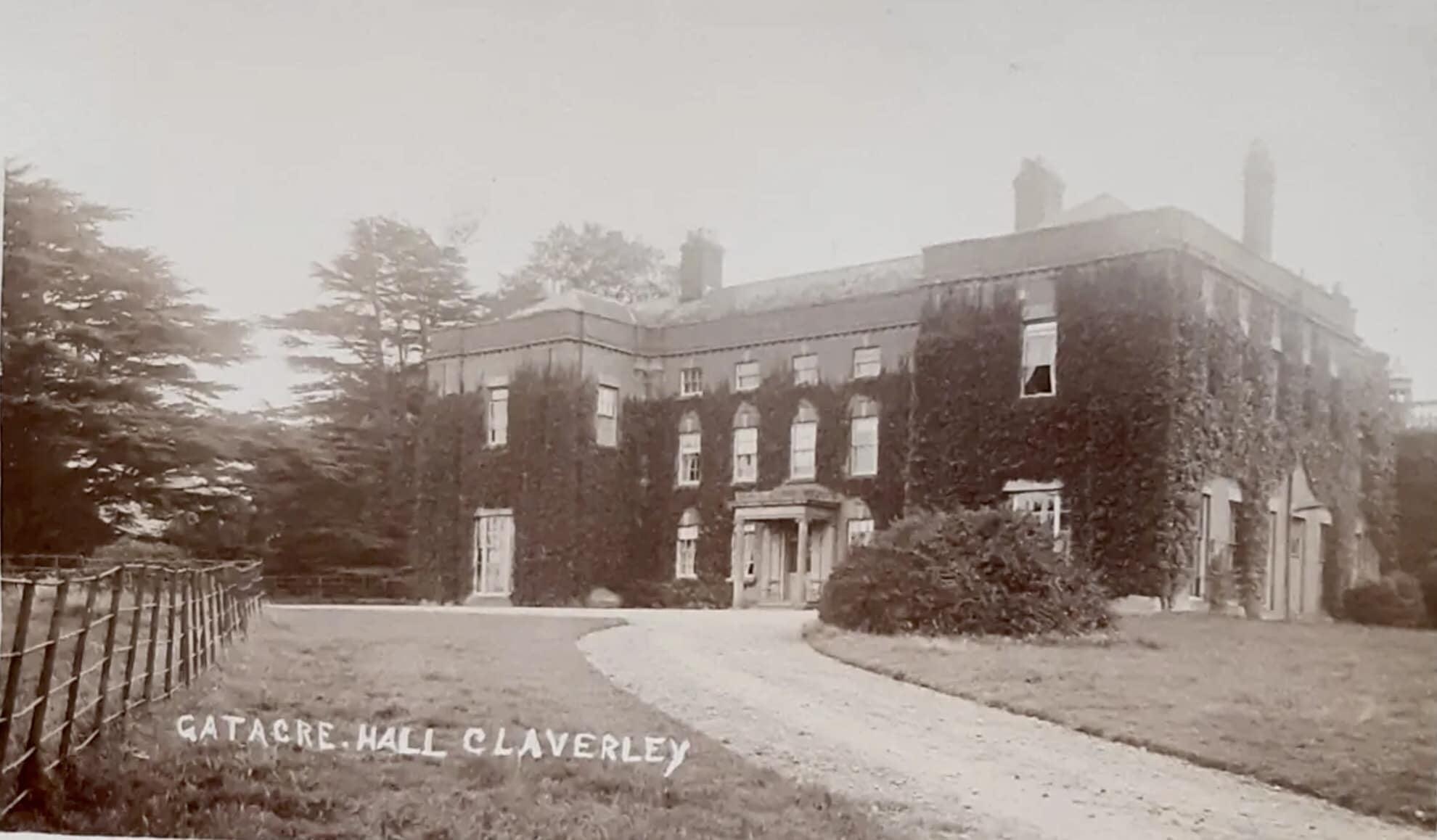
In the early 1950s my uncle John and his friend, possibly John Clare, ventured into an abandoned old house while out walking in Shropshire. He (or his friend) saved an old book from the vandalised dereliction and took it home. Somehow my mother ended up with the book.
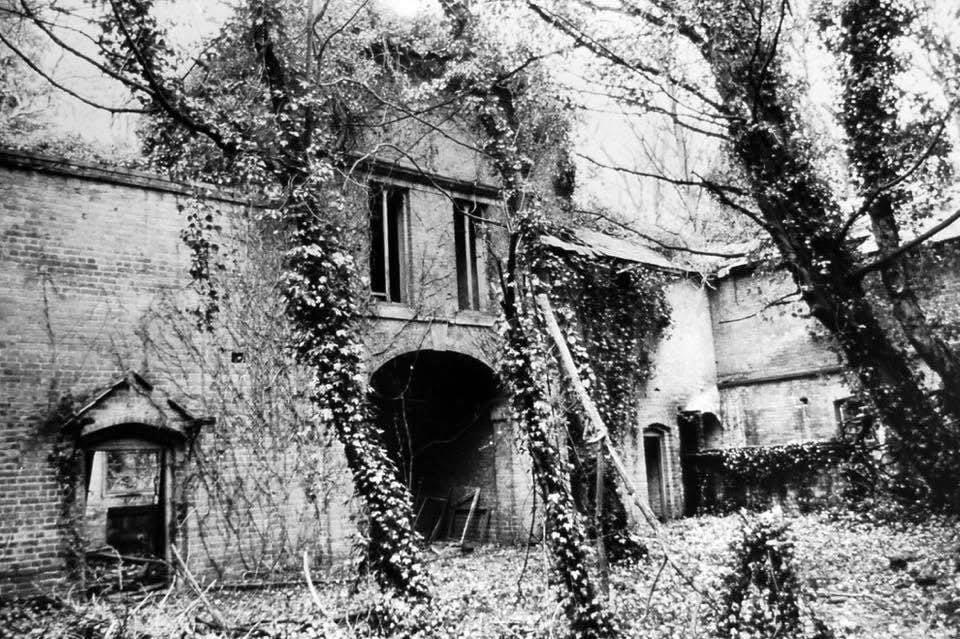
I remember that we had the book when we were living in USA, and that my mother said that John didn’t want the book in his house. He had said the abandoned hall had been spooky. The book was heavy and thick with a hard cover. I recall it was a “magazine” which seemed odd to me at the time; a compendium of information. I seem to recall the date 1553, but also recall that it was during the reign of Henry VIII. No doubt one of those recollections is wrong, probably the date. It was written in English, and had illustrations, presumably woodcuts.
I found out a few years ago that my mother had sold the book some years before. Had I known she was going to sell it, I’d have first asked her not to, and then at least made a note of the name of it, and taken photographs of it. It seems that she sold the book in Connecticut, USA, probably in the 1980’s.
My cousin and I were talking about the book and the story. We decided to try and find out which abandoned house it was although we didn’t have much to go on: it was in Shropshire, it was in a state of abandoned dereliction in the early 50s, and it contained antiquarian books.
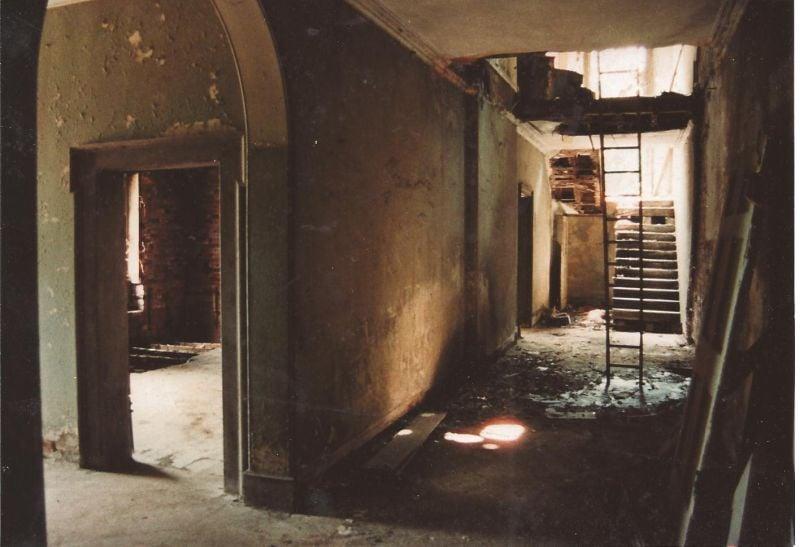
I posted the story on a Shropshire History and Nostalgia facebook group, and almost immediately had a reply from someone whose husband remembered such a place with ancient books and manuscripts all over the floor, and the place was called Gatacre Hall in Claverley, near Bridgnorth. She also said that there was a story that the family had fled to Canada just after WWII, even leaving the dishes on the table.
The Gatacre family sailing to Canada in 1947:
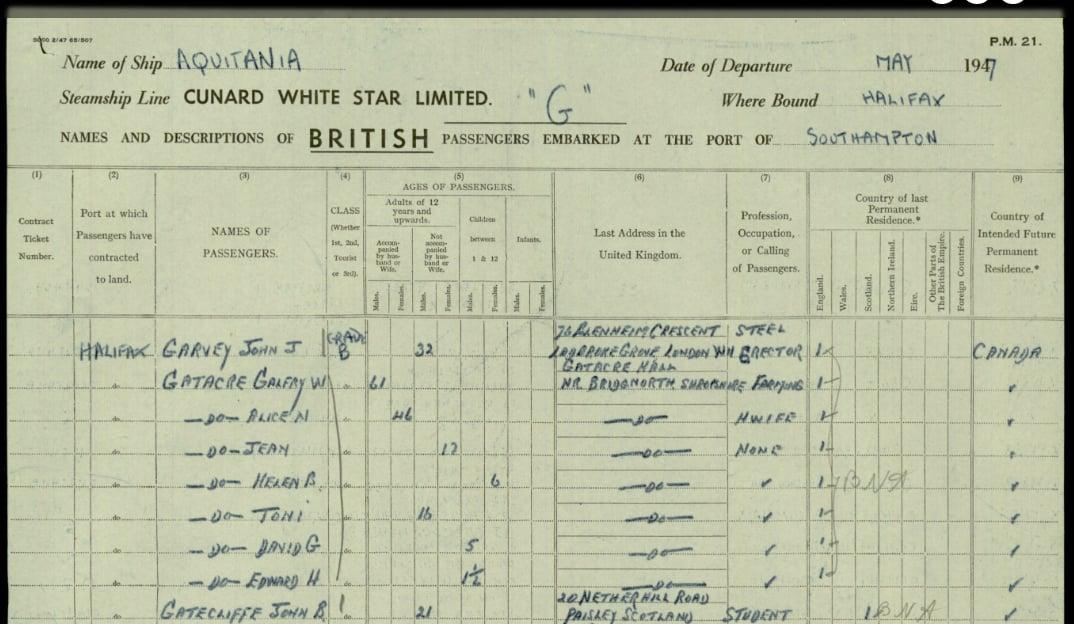
When my cousin heard the name Gatacre Hall she remembered that was the name of the place where her father had found the book.
I looked into Gatacre Hall online, in the newspaper archives, the usual genealogy sites and google books searches and so on. The estate had been going downhill with debts for some years. The old squire died in 1911, and his eldest son died in 1916 at the Somme. Another son, Galfrey Gatacre, was already farming in BC, Canada. He was unable to sell Gatacre Hall because of an entail, so he closed the house up. Between 1945-1947 some important pieces of furniture were auctioned, and the rest appears to have been left in the empty house.
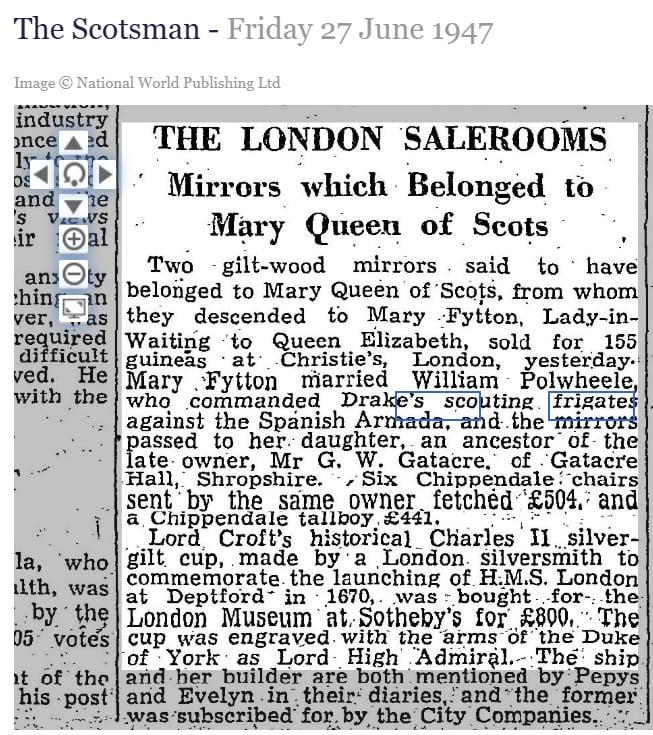
The family didn’t suddenly flee to Canada leaving the dishes on the table, although it was true that the family were living in Canada.
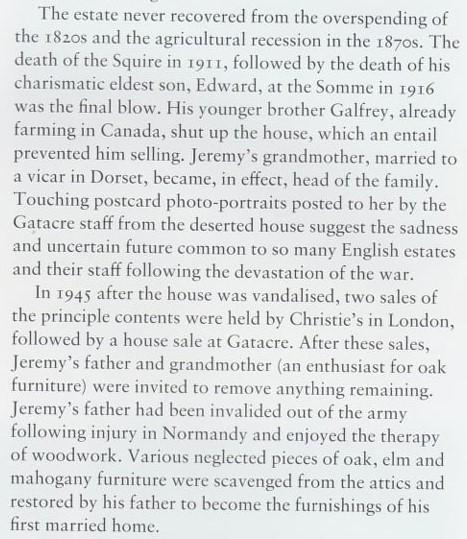
An interesting thing to note here is that not long after this book was found, my parents moved to BC Canada (where I was born), and a year later my uncle moved to Toronto (where he met his wife).
Captain Gatacre in 1918:
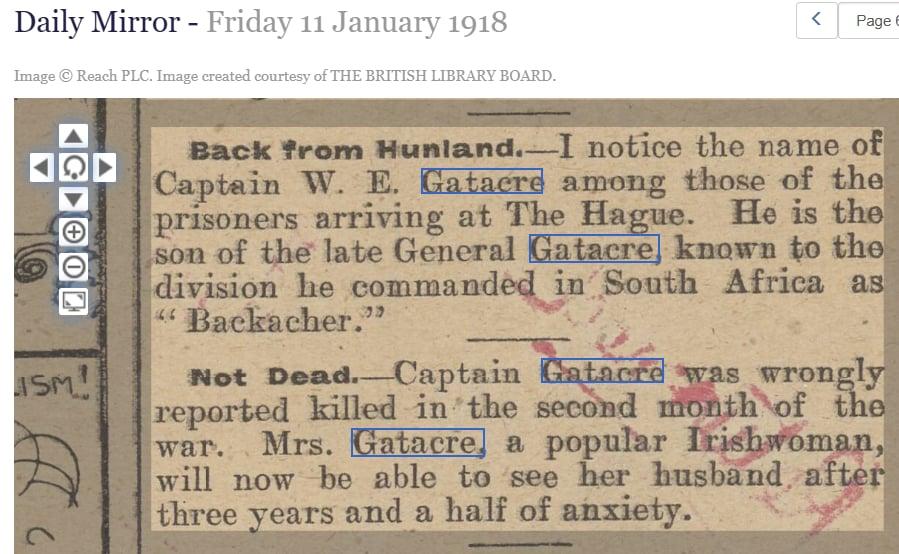
The Gatacre library was mentioned in the auction notes of a particular antiquarian book:
“Provenance: Contemporary ownership inscription and textual annotations of Thomas Gatacre (1533-1593). A younger son of William Gatacre of Gatacre Hall in Shropshire, he studied at the English college at the University of Leuven, where he rejected his Catholic roots and embraced evangelical Protestantism. He studied for eleven years at Oxford, and four years at Magdalene, Cambridge. In 1568 he was ordained deacon and priest by Bishop of London Edmund Grindal, and became domestic chaplain to Robert Dudley, 1st Earl of Leicester and was later collated to the rectory of St Edmund’s, Lombard Street. His scholarly annotations here reference other classical authors including Plato and Plutarch. His extensive library was mentioned in his will.”
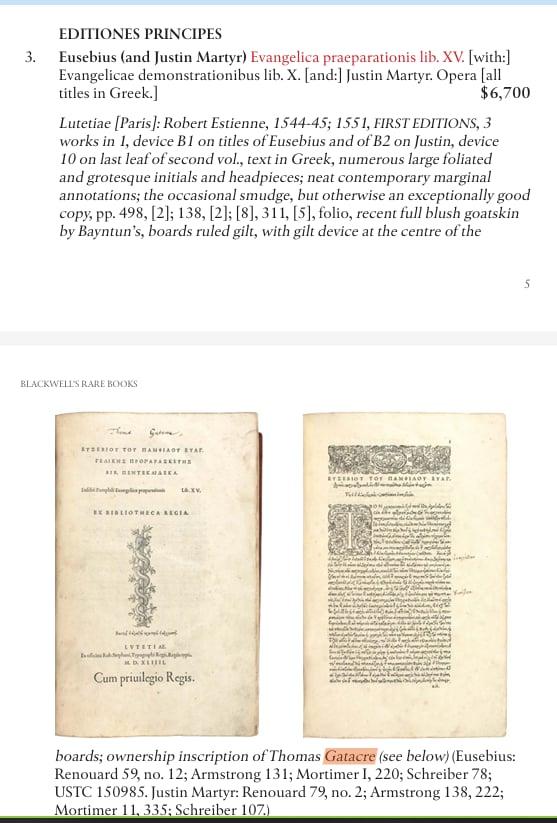
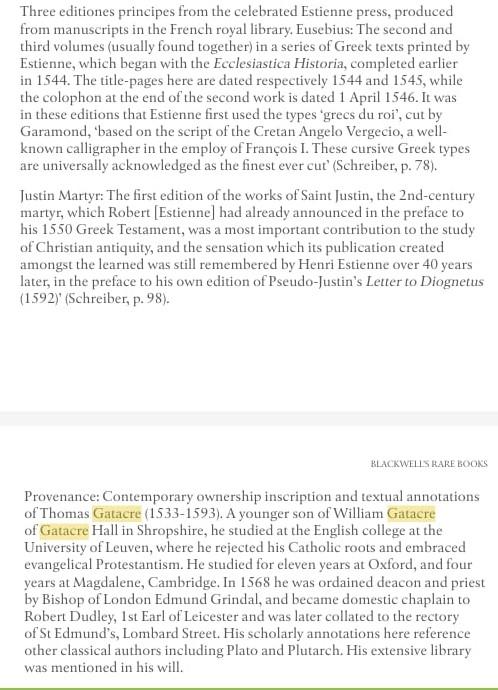
There are thirty four pages in this 1662 book about Thomas Gatacre d 1654:
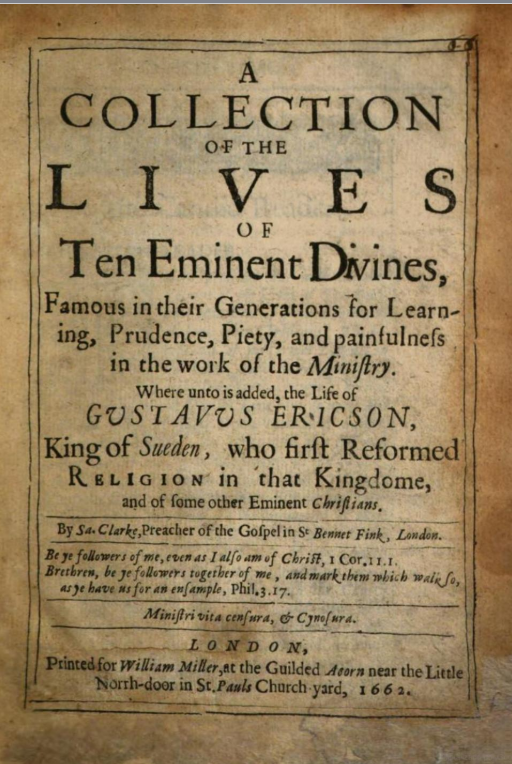
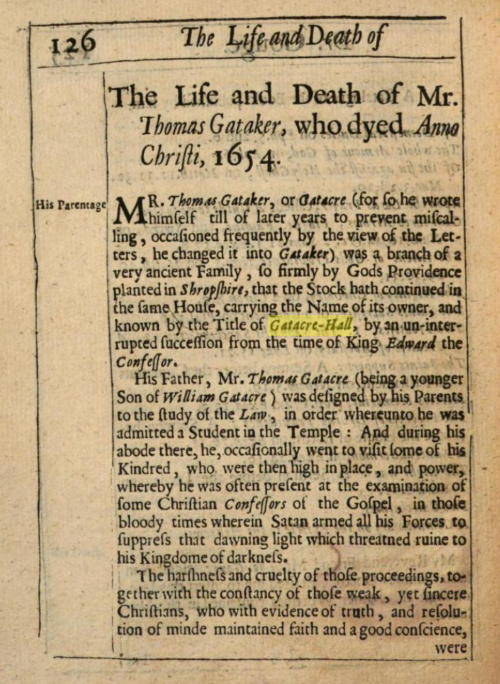 June 21, 2025 at 2:27 am #7965
June 21, 2025 at 2:27 am #7965In reply to: Cofficionados Bandits (vs Lucid Dreamers)
Ricardo noticed, with growing unease, that he hadn’t been included in recent events.
Had he been written out? Or worse, had he written himself out?New characters were arriving constantly, but he couldn’t make head nor tail of most of them — especially with their ever-changing names.
He contemplated slinking back behind the bush … but this tree business, all the crouching and lurking, was getting embarrassing.
For goodness’ sake, Ricardo, he admonished himself, stop being so pathetic.
It wasn’t until the words echoed back at him that he realised, with horror, his internal voice now sounded exactly like Miss Bossy Pants.
He frantically searched for a different voice.
It’s a poor workman blames his tools, Ricardo. Miss Herbert, Primary School. Her long chin and pursed lips hovering above his scribbled homework.
Really, Ricardo. A journalist? Is that what you want to be? His father’s voice, dripping with disdain.
Any hope for a comment, Ricardo? Miss Bossy Pants again, eyes rolling.
Ricardo sighed. Then — brainwave! If he could be the one to return the gazebo, maybe they’d write him back in
Or … he stood up tall and squared his shoulders … he would jolly well write himself back in!
He’d have his work cut out to beat Chico, though, with the elaborate triple-reverse-double-flip of the worry beads and all that purposeful striding. One had to admit, the man had momentum when he made the effort. It was uncharitable, he knew, but Ricardo decided he preferred Chico when he was spitting.
June 11, 2025 at 10:13 am #7959In reply to: Cofficionados Bandits (vs Lucid Dreamers)
“Buns and tarts!” called a street vendor from the street outside the Gazebar. “Freshly baked Memory Pies! Nostalgia Rolls! Selling like Hot Cakes! Come and get ’em before they run out!”
Chico realised he’d hardly eaten a thing since becoming a new character. Maybe this is how character building works.
“I’ll take one of each,” Chico said to the smiling round faced vendor. I need to stock up on memories.
“Are they all for you, sir?” the vendor asked. Chico couldn’t help thinking he looked like a frog. Nodding, Chico said, “Yeah, I’m hungry for a past.”
“We normally suggest just one at a time,” the frog said (for he had indeed turned into a frog), “But you look like a man with a capacity for multiple memories. Are you with friends?”
“Er, yeah, yes I’m with friends,” Chico replied. Are the other new characters my friends? “Yes, of course, I have lots of friends.” He didn’t want the frog vendor to think he was friendless.
“Then we suggest you share each cake with the friends you want to share the memory with.”
“Oh right. But how do I know what the memory is before I eat the cake?”
“Let me ask you this,” said the frog with a big smile, “Do real people choose who to share their memories with? Or know in advance what the memories will be?”
“How the hell would I know!” Chico said, roughly grabbing the paper bag of buns. “I’m new here!”
June 11, 2025 at 9:14 am #7958In reply to: Cofficionados Bandits (vs Lucid Dreamers)
Chico poured grenadine into an ornate art nouveau glass filled with ginger ale. He hesitated, eying the tin of chicory powder. After a moment of deliberation, he sprinkled a dash into the mix, then added the maraschino cherry.
“I’m not sure Ivar the Boneless, chief of the Draugaskald, will appreciate that twist on his Shirley Temple,” said Godrick. “He may be called Boneless, but he’s got an iron grip and a terrible temper when he’s parched.”
Chico almost dropped the glass. Muttering a quick prayer to the virgin cocktail goddess, he steadied his hand. Amy wouldn’t have appreciated him breaking her freshly conjured aunt Agatha Twothface’s crystal glasses service.
“I don’t know what you mean,” said Chico a tad too quickly. “Do I know you?”
“I’m usually the one making the drinks,” said Godrick. “I served you your first americano when you popped into existence. Chico, right?”
“Oh! Yes. Right. You’re the bartender,” Chico said. He fidgeted. Small talks had always made him feel like a badly tuned Quena flute.
“I am,” said Godrick with a wink. “And if you want a tip? Boneless may forgive you the chicory if you make his cocktail dirty.”
Chico pause, considered, then reached down, grabbed a pinch of dust from the gazebo floor, and sprinkled it on the Temple, like cocoa on a cappuccino foam. He’d worked at Stardust for years before appearing here, after all. When he looked up, Godrick was chuckling.
“Ok!” Godrick said. “Now, add some vodka. I think I’ll take it to Ivar myself.”
“Oh! Right.” Chico nodded, grabbed the vodka bottle and poured in a modest shot and placed it back on the table.
Godrick titled his head. “Looks like your poney wants a sip too.”
For a moment, Chico blinked in confusion at the black stuffed poney standing nearby. Then freshly baked memories flooded in.
Right, the poney’s name was Tyrone.
It had been a broken toy that someone had tossed in the street. Amy had insisted Chico take it home. “It needs saving,” she said. “And you need the company.”
At first, Chico didn’t know what to do with it. He ended up replacing some of the missing stuffing with dried chicory leaves.
The next morning, Tyrone was born and trotting around the apartment. All he ever wanted was strong alcohol.
Chico had a strange thought, scrolling across the teleprompter in his mind.
Is that how character building works?
June 10, 2025 at 7:59 pm #7957In reply to: Cofficionados Bandits (vs Lucid Dreamers)
Still visibly shaken, Sir Humphrey blinked up at the canopy. “Is it… raining? Is it raining ants?”
“It’s not rain,” muttered Thiram, checking his gizmos. “Not this time. It’s like… gazebo fallout. I’d venture from dreams hardening midair.”
Kit shuffled closer to Amy, speaking barely above a whisper. “Aunt Amy, is it always like this?”
Amy sighed, pinched the bridge of her nose, and said, “No, sweetheart. Sometimes it’s worse.”
“Right then,” declared Carob, making frantic gestures in the air, as though she’d been sparring the weather. “We need to triangulate the trajectory of the gazebo, locate the Sabulmantium, and get Sir Humphrey a hat before his dignity leaks out his ears.”
“I feel like Garibaldi,” Sir Humphrey murmured, dazedly stroking his forehead.
“Do you remember who Garibaldi is?” Chico asked, narrowing his eyes.
“No,” the Padre confessed. “But I’m quite certain he’d never have let his gazebo just float off like that.”
Meanwhile, Madam Auringa had reappeared behind a curtain of mist smelling faintly of durian and burnt cinnamon.
“The Sabulmantium has been disturbed,” she intoned. “Intent without anchor will now spill into unintended things. Mice shall hold council. Socks will invert themselves. Lost loves shall write letters that burn before reading.”
“Typical,” muttered Thiram. “We poke one artifact and the entire logic stack collapses.”Kit raised a trembling hand. “Does that mean I’m allowed to choose my name again?”
“No,” said Amy, “But you might be able to remember your original one—depending on how many sand spirals the Sabulmantium spins.”
“I told you,” Chico interjected, gesturing vaguely at where the gazebo had vanished over the treetops. “It was no solar kettle. You were all too busy caffeinating to notice. But it was focusing something. That sand’s shifting intent like wind on a curtain.”
“And we’ve just blown it open,” said Carob.
“Yup,” said Amy. “Guess we’re going gazebo-chasing.”
June 10, 2025 at 7:39 pm #7956In reply to: Cofficionados Bandits (vs Lucid Dreamers)
“Solar kettle, my ass,” Chico muttered, failing to resist the urge to spit. After wiping his chin on his tattood forearm, he spoke up loudly, “That was no solar kettle in the gazebo. That was the Sabulmantium!”
An audible gasp echoed around the gathering, with some slight reeling and clutching here and there, dropping jaws, and in the case of young Kit, profoundly confused trembling.
Kit desperately wanted to ask someone what a Sabulmantium was, but chose to remain silent.
Amy was frowning, trying to remember. Sure, she knew about it, but what the hell did it DO?
A sly grin spread across Thiram’s face when he noticed Amy’s perplexed expression. It was a perfect example of a golden opportunity to replace a memory with a new one.
Reading Thiram’s mind, Carob said, “Never mind that now, there’s a typhoon coming and the gazebo has vanished over the top of those trees. I can’t for the life of me imagine how you can be thinking about tinkering with memories at a time like this! And where is the Sabulmantium now?”
“Please don’t distress yourself further, dear lady, ” Sir Humphrey gallantly came to Carob’s aid, much to her annoyance. “Fret not your pretty frizzy oh so tall head.”
Carob elbowed him in the eye goodnaturedly, causing him to stumble and fall. Carob was even more annoyed when the fall rendered Sir Humphrey unconscious, and she found herself trying to explain that she’d meant to elbow him in the ribs with a sporting chuckle and had not intentionally assaulted him.
Kit had been just about to ask Aunt Amy what a Sabulmantium was, but the moment was lost as Amy rushed to her fathers side.
After a few moments of varying degrees of anguish with all eyes on the prone figure of the Padre, Sir Humphrey sat up, asking where his Viking hat was.
And so it went on, at every mention of the Sabulmantium, an incident occured, occasioning a diversion on the memory lanes.
June 6, 2025 at 6:02 pm #7954In reply to: Cofficionados Bandits (vs Lucid Dreamers)
Another one! A random distant memory wafted into Amy’s mind. Uncle Jack always used to say GATZ e bo. Amy could picture his smile when he said it, and how his wife always smiled back at him and chuckled. Amy wondered if she’d even known the story behind that or if it had always been a private joke between them.
“What’s been going on with my gazebo?” Amy’s father rushed into the scene. So that’s what he looks like. Amy couldn’t take her eyes off him, until Carob elbowed her in the neck.
“Sorry, I meant to elbow you in the ribs, but I’m so tall,” Carob said pointlessly, in an attempt to stop Amy staring at her father as if she’d never seen him before.
Thiram started to explain the situation with the gazebo to Amy’s father, after first introducing him to Kit, the new arrival. “Humphrey, meet Kit, our new LBGYEQCXOJMFKHHVZ story character. Kit, this is Amy’s father who we sometimes refer to as The Padre.”
“Pleased to meet you, ” Kit said politely, quaking a little at the stern glare from the old man. What on earth is he wearing? A tweed suit and a deerstalker, in this heat! How do I know that’s what they’re called? Kit wondered, quaking a little more at the strangeness of it all.
“Never mind all that now!” Humphrey interrupted Thiram’s explanation.
Still as rude as ever! Amy thought.
“I’ve too much to think about, but I’ll tell you this: I’ve planned a character building meeting in the gazebo, and you are all invited. As a matter of fact,” Humphrey continued, “You are all obliged to attend. If you choose not to ~ well, you know what happened last time!”
“What happened last time?” asked Carob, leaning forward in anticipation of an elucidating response, but Humphrey merely glared at her.
Amy sniggered, and Humphrey shot her a lopsided smile. “YOU know what happened in Jack’s GATZ e bo, don’t you, my girl?”
Where were those random memories when you wanted them? Amy had no idea what he was talking about.
“Who else is invited, Humph? asked Chico, resisting the urge to spit.
“My good man,” Humphrey said with a withering look. “Sir Humphrey’s the name to you.”
Sir? what’s he on about now? wondered Amy. Does that make me a Lady?
“Who else is invited, Padre?” Amy echoed.
Humphrey pulled a scroll tied with a purple ribbon out of his waistcoat pocket and unfurled it. Clearing his throat importantly, he read the list to all assembled.
Juan and Dolores Valdez.
Godric, the Swedish barman
Malathion and Glyphosate, Thiram’s triplet brothers. Mal and Glyph for short.
Liz Tattler
Miss Bossy Pants
Goat Horned Draugaskald“Did I forget anyone?” Humphrey asked, peering over his spectacles as he looked at each of the characters. “You lot,” he said, “Amy, Carob, Thiram, Chico, Kit and Ricardo: you will be expected to play hosts, so you might want to start thinking about refreshments. And not,” he said with a strong authoritarian air, “Not just coffee! A good range of beverages. And snacks.”
Thiram, leaning against a tree, started whistling the theme tune to Gone With The Wind. Tossing an irritated glance in his direction, Carob roughly gathered up her mass of frizzy curls and tethered it all in a tight pony tail. I still don’t know what happened before, she fumed silently. The latest developments where making her nervous. Would they find out her secret?
“You guys,” called Chico, who had wandered over to the gazebo. “It’s full of ants.”
June 6, 2025 at 10:32 am #7953In reply to: Cofficionados Bandits (vs Lucid Dreamers)
Carob was the first to find the flyer. It had been pinned to the banyan tree with a teaspoon, flapping just slightly in the wind like it knew how ridiculous it was.
FIVE HURT IN GAZEBO DRAMA
Local Brewmaster Suspected. Coffee Stains Incriminating.She tapped it twice and announced to no one in particular, “I told you gazebos were structurally hostile.”
Amy poked her head out of the linen drying shed. “No, you said they were ‘liminal spaces for domestic deceit.’ That’s not the same as a health hazard.”
“You ever been in a gazebo during a high wind with someone named Derek? Exactly.”
Ricardo ran past them at an awkward crouch, muttering into a device. “…confirming perimeter breach… one is wearing a caftan, possibly hallucinating… I repeat, gazebo situation is active.”
Chico wandered in from the side trail, his shirt unbuttoned, leaf in mouth, mumbling to Kit. “I don’t know what happened. There was a conversation about frothed chalk and cheese, and then everything… rotated.”
Kit looked solemn. “Aunt Amy, he sat on it.”
“He sat on the gazebo?” Amy blinked.
“No. On the incident.”
Kit offered no further explanation.
From the underbrush, a low groan emerged. Thiram’s voice, faint: “Someone built a gazebo over the generator hatch. There are no stairs. I fell in.”
Amy sighed. “Goddammit, Thiram.”
Carob smirked. “Gazebo’d.”
May 23, 2025 at 9:19 pm #7951In reply to: Cofficionados Bandits (vs Lucid Dreamers)
Disgruntled and bored with the fruitless wait for the other characters to reveal more of themselves, Amy started staying in her room all day reading books, glad that she’d had an urge to grab a bag full of used paperbacks from a chance encounter with a street vendor in Bogota.
A strange book about peculiar children lingered in her mind, and mingled somehow with the vestiges of the mental images of the writhing Uriah in the book Amy had read prior to this one.
Aunt Amy? a childs voice came unbidden to Amys ear. Well, why not? Amy thought, Some peculiar children is what the story needs. Nephews and neices though, no actual children, god forbid.
“Aunt Amy!” A gentle knocking sounded on the bedroom door. “Are you in there, Aunt Amy?”
“Is that at neice or nephew at my actual door? Already?” Amy cried in amazement.
“Can I come in, please?” the little voice sounded close to tears. Amy bounded off the bed to unloock leaving that right there the door to let the little instant ramen rellie in.
The little human creature appeared to be ten years old or so, as near as Amy could tell, with a rather androgenous look: a grown out short haircut in a nondescript dark colour, thin gangling limbs robed in neutral shapelessness, and a pale pinched face.
“I’ve never done this before, can you help me?” the child said.
“Never been a story character before, eh?” Amy said kindly. “Do you know your name? Not to worry if you don’t!” she added quickly, seeing the child’s look of alarm. “No? Well then you can choose what ever you like!”
The child promptly burst into tears, and Amy wanted to kick herself for being such a tactless blundering fool. God knows it wasn’t that easy to choose, even when you knew the choice was yours.
Amy wanted to ask the child if it was a boy or a girl, but hesitated, and decided against it. I’ll have to give it a name though, I can’t keep calling it the child.
“Would you mind very much if I called you Kit, for now?” asked Amy.
“Thanks, Aunt Amy,” Kit said with a tear streaked smile. “Kit’s fine.”
May 18, 2025 at 12:32 pm #7947In reply to: Cofficionados Bandits (vs Lucid Dreamers)
Chico drank the cup of freshly ground coffee beans. He winked with distaste and jotted a few words on his notebook before trying a second batch of ground coffee beans.
He wasn’t aware of much from his past life, or if he even had a life before the others summoned him. They were a mystery to him, and he didn’t understand the reasons or the purpose of his existence. He didn’t even like coffee; he only pretended to, because the job and his own physical appearance kind of fit with the stereotype. He chuckled thinking it could be a stereotypo.
He thought the taste of coffee was the reason why he chewed betel leaves. Their taste, slightly spicy and pungent with hints of clove and cinnamon helped mask the bitterness of the coffee he had to drink. He suddenly became aware of some other information about himself. He could swear he had forgotten them, they simply weren’t there before. His father had lost his teeth. The reason wasn’t clear yet, but looming behind the jungle trees. What about his mother? Was she slim or fat? Both possibilities flickered in his head and disappeared. Apparently it hadn’t been chosen yet. He pondered about that last remark before forgetting it.
Too many weird questions were passing through his fat head. The heat and sweat were no good for his mental health… because of all the flies. He wondered if that was the reason why the old lady had started breeding them under her rooftop. She claimed it was an infestation but he had seen her secretly releasing swarms of flies in the evening, exciting the cauldron of bats. She had seen him looking at her, but they had tacitly convened they would not betray each other’s secret. Only, Chico wasn’t yet aware of what his own secret was.
He winced as he tasted the third batch of coffee from the plantation.
May 10, 2025 at 10:01 am #7931In reply to: Cofficionados Bandits (vs Lucid Dreamers)
Carob wrinkled her nose in distaste and languidly remarked, “Amy, that goaty odour seems to be emanating from your clothing. Does it perchance require laundering?”
Chico laughed loudly, spitting equally audibly. “Hi,” he said, “The name’s Chico,” emerging from behind the tulip tree.
Carob winced at the spitting, and Amy writhed a little at being humiliated in front of the man. They both ignored him, and he regretted not staying hidden.
“I’ve just pegged out two loads of washing, for your information, not that it will dry in this rain,” Amy said, quickly tying her hair back in annoyance. Does this move the story forward? she wondered. Why do I have a smelly character anyway? I’m sweaty, goaty and insecure, how did it happen?
“Never mind that anyway, have you seen what’s on todays news?” Carob asked, feeling sorry for making Amy uncomfortable.
“I have,” remarked Chico, with a hopeful expression, but the women ignored him.
May 10, 2025 at 9:02 am #7925In reply to: Cofficionados – What’s Brewing
Chico Ray
Chico Ray
Directly Stated Visual and Behavioral Details:
-
Introduces himself casually: “Name’s Chico,” with no clear past, suggesting a self-aware or recently-written character.
-
Chews betel leaves, staining his teeth red, which gives him a slightly unsettling or feral appearance.
-
Spits on the floor, even in a freshly cleaned café—suggesting poor manners, or possibly defiance.
-
Appears from behind a trumpet tree, implying he lurks or emerges unpredictably.
-
Fabricates plausible-sounding geo-political nonsense (e.g., the coffee restrictions in Rwanda), then second-guesses whether it was fiction or memory.
Inferred Traits:
-
A sharp smile made more vivid by betel staining.
-
Likely wears earth-toned clothes, possibly tropical—evoking Southeast Asian or Central American flavors.
-
Comes off as a blend of rogue mystic and unreliable narrator, leaning toward surreal trickster.
-
Psychological ambiguity—he doubts his own origins, possibly a hallucination, dream being, or quantum hitchhiker.
What Remains Unclear:
-
Precise age or background.
-
His affiliations or loyalties—he doesn’t seem clearly aligned with the Bandits or Lucid Dreamers, but hovers provocatively at the edges.
May 7, 2025 at 7:04 pm #7917In reply to: Cofficionados Bandits (vs Lucid Dreamers)
Chico noticed the inching bush from his hidden vantage point behind the tulip tree. For a moment he wished he wasn’t quite so solitary, and regretted that there was nobody to say look at that bush inching along over there to.

“Sssh!” whispered Carob, holding a hand up to silence Amy. “Did you hear that? Listen! There it is again!”
“Sounds like someone spitting behind that tulip tree. But look over there!” Amy cried, “I never saw such a thing, that bush is moving.”
“And it’s heading towards the tulip tree spitter,” Carob replied grimly. “This could get serious.”
-
-
AuthorSearch Results
